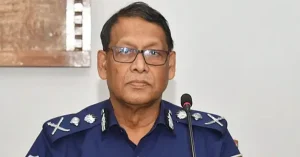Police are facing serious complications in investigating the murder and attempted murder cases filed in connection with the July uprising. Nearly 10 months have passed, yet not a single one of the 600 murder cases has been concluded.
Inspector General of Police (IGP) Baharul Alam told Times of Bangladesh that investigating officers are carefully reviewing each case, and all cases are under constant supervision.
“Many complainants have intentionally named innocent individuals. Some are filing objections in court and allegedly accepting money. However, we are ensuring that no innocent person is punished,” the IGP said.

He added that around 1,500 cases were filed in connection with July-August uprising, including 600 for murder.
Meanwhile, over 350 complaints have been submitted to the International Crimes Tribunal (ICT). This has raised questions about how police investigations and tribunal trials will be coordinated.
ICT prosecutor Gazi MH Tamim told Times of Bangladesh: So far, we’ve received more than 350 complaints, including murders, abduction, and torture – crimes against humanity. These don’t fall under regular police or Penal Code jurisdiction but under the Tribunal’s purview.
“Two parallel legal processes may emerge – one under the Penal Code and another under international crimes jurisdiction. However, the accused in each won’t necessarily be the same. The tribunal will follow its own legal framework,” he said.
According to police, lack of credible evidence and witnesses is a major hurdle in many of the cases. In several instances, the FIRs don’t match facts, autopsies weren’t conducted, and case motives are unclear.
Political pressure, biased complainants, misleading accusations, and logistical shortages have further complicated matters.
Additional IGP (Crime and Operations) Khandaker Rafiqul Islam confirmed to Times of Bangladesh that no charge-sheet has been filed in any of the July murder cases, although around 20 non-murder cases have seen investigation reports submitted.
Officials note that absence of autopsies, lack of eyewitnesses, investigators’ limitations, complainants going missing or changing statements are impeding progress.
For instance, two separate murder cases in Savar illustrate the problem.
On August 5, madrasa student Hasibur Rahman was killed near Savar police station. His uncle Fuad Hossain filed a case naming former PM Sheikh Hasina, five police officers, and 1,500 others. The investigating officer later died in a road accident, stalling the investigation.
Plaintiff Fuad Hossain said, “No autopsy was conducted on the body. I went to the police station twice from Keraniganj, but no one contacted me. I didn’t even know that the investigating officer had passed away.”
On the same day, Maruf Mithu was shot dead on College Road in Savar. His father, Shahjahan, filed a case.
The current investigating officer, SI Atal Bihari Biswas, who took over after a transfer, said, “The plaintiff has submitted an affidavit objecting to several of the accused. As a result, we are facing confusion in the investigation process.”
In many cases, the complainant themselves expressed unwillingness to proceed with a postmortem examination.
In Gulshan, a case was filed over the death of student Naimur Rahman, by his father Naimur Rahman, naming 64 individuals. But the father declined an autopsy.
Detective Branch Inspector Nurul Islam, the investigating officer, stated: Without an autopsy, filing a charge-sheet weakens the case.

Similarly, in Dinajpur, the family of murdered college student Robiul Islam also refused a postmortem.
PBI Inspector Pradip Kumar Roy said: “Robiul’s family did not allow the autopsy, so no forensic report could be prepared. Now we have to prepare the charge-sheet as per directives.
The case of Jubo Dal activist Mohiuddin, who was killed in Dhaka’s Mirpur, reflects a similar pattern. The autopsy could not be conducted due to objections from the family.
Investigating officer Alamgir Hossain said, “We are doing our best based on the available information and evidence. But in judicial proceedings, proof is the main tool.”
Some cases show complainants using previous disputes to frame innocent people. In one Savar case, the accused turned out to have a long-standing land feud with the complainant.
SI Motiur Rahman of Savar Police Station said: In the case of a madrasa student’s death, the plaintiff has accused a man from Singair. The investigation revealed that there had been a longstanding land dispute between them.
Further complications arose when multiple cases were filed over the same incident in different police stations – as seen with Shariful Islam Sojal’s cases in Ashulia and Dhamrai.
In another case, 87 people were named along with 2,000 unidentified suspects in the murder of pickup driver Shaheen in Jatrabari. His wife Swapna Begum claims she named only four.
Similarly, in the case of the killing of school student Motalib at Jigatola on August 4, although his father initially filed the case, later another unidentified person submitted a fresh complaint in court.
Two separate cases were filed over the same incident in Dhaka’s Jatrabari and Kadamtali police stations regarding the murder of Md. Mehedi Hasan Pranto in Rayerbagh.
There’s even confusion in Kishoreganj, where Dulal Robi Das’s death was medically certified as a stroke, yet a murder case alleges he was shot during protests.
Due to these complexities, many officers are requesting transfers away from the cases.
However, Dhaka Metropolitan Police Additional Commissioner S.N.M. Nazrul Islam denied this to Times of Bangladesh, saying some officers sought transfers due to high workload and living costs in Dhaka, but the situation is now under control.
So far, nearly 150,000 people have been accused in these cases, including top Awami League leaders. About 12,000 people are in jail, including 28 police officers. Former PM Sheikh Hasina is the chief accused in most cases.


